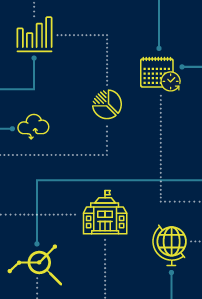Collaborations Across Campus and the Data Diaspora

The growth of reporting requirements and the expansion of data use to support higher education decision-making has presented both opportunities and challenges for data stewards. Institutional research offices possess functions that derive from a number of areas. In some aspects, our office has an IT function as many of us work with databases and may be familiar with the backend technologies that house and protect personal information. And speaking of personal information, our access and use of those data require the compliance and safeguards associated with a finance or human resources office. And finally, the vast majority of our records involve some form of student information be it applicant data, academic history, or alumni records. What we do with those data is almost as varied! We craft visual presentations for the public, complete esoteric reporting forms, and advocate for solutions to any problem that data can help to address.
So, the ideal IR office is the largest department on campus, directed by an officer who has mastered every function of the college, right? Of course, in reality, the skills required for your IR office vary from institution to institution depending on the school’s needs and the way Institutional Research fits into that college’s organizational structure. However, you need data from everyone. In addition, the specialists who handle your institution’s student data everyday work in Student Affairs, and so forth for financial, employee, or alumni data. For smaller institutions in particular, the IR office may be a single person or a director working with a technical lead. Yet that one or two person office requires input and cooperative effort from all departments across campus. How do we achieve that?
The IR Director as Project Manager
This situation presents both unique challenges and, at the risk of using a cliché, opportunities. Administrative functions becoming increasingly specialized in higher education. The chance to lead collaborative projects that deeply engage these specialties and delve into each subject area can be difficult to find. Because we are pulled so many directions or lack the area-specific expertise, we often ask those departments to share data that has been curated to fit terms commonly understood by a broader audience. Or, we build off of public facing data like IPEDS statistics. It is possible to perform most IR functions by operating on such a surface level. When we trust our colleagues and their data, compliance is straight-forward. Pre-calculated statistics can be shaped into informative reports for various audiences. But what if the IR office possessed a detailed knowledge of finance processes, academic record processing, and the state’s requirements for human resources reporting?
We’ve established that the IR director can’t be omniscient and that some IR departments lack the numbers to retain a team of specialists. Yet the projects and IR department leads - accreditation, assessment, strategic planning, or more – require exactly that. Here, the IR director can act as a project manager. Rather than asking for data from each office, for larger initiatives the director can create positions of responsibility within the structure of the project that provide incentives and ownership for the participants.
My predecessor, Michelle McMillian, made excellent use of this method when preparing for our accreditation review by the Higher Learning Commission. She not only created sub-committees based on the criteria for accreditation, but she also provided the sub-committee chairs with significant opportunities. The sub-committees were given research and reporting tasks that drew from the expertise of the chairs in their areas of specialty. These teams were acknowledged in our documentation, communication about accreditation, year-end meetings, and during the actual accreditation visit. The chairs also had opportunities for professional development, including travel to the Higher Learning Commission conference and internal recognition – which Michelle intentionally cultivated - as experts on the accreditation process. This process inspired my own interest in Institutional Research and led me to make the transition from faculty to administration. Now, I try to follow her example by coordinating our transition to a new ERP system as the college transitions to Ellucian Banner and in my own work toward our 10-year accreditation review in 2023-24.
This approach also helps with other challenges common to institutional research and assessment. For example, assessment initiatives rely heavily on representatives from the faculty and other service areas. When engaged, they can show their peers why your data needs benefit their departmental mission and therefore should be a priority. Those representatives can be empowered and offered opportunities for professional development. They can also be the people the IR office turns to when looking for those hidden pockets of data on our campuses that exist due to technology differences, department specific requirements, or internal projects that don’t inherently report to IR.
In the end, higher education is a people-focused profession. We serve students and carry that spirit of service into our support for fellow faculty and staff. Institutional research officers understand that the information we derive from data must have a purpose and support that service mission. To do that more effectively, we have to become leaders who empower others on our campus. In doing so, we will better understand other departments’ processes, produce better data, and reach a broader audience with more effective information.
 Michael Lejman is the Associate Vice Chancellor for Institutional Research and Effectiveness at Arkansas State University Mid-South. He holds a Ph.D. in history, which he taught before becoming a specialist in data science, accreditation, and higher ed policy.
Michael Lejman is the Associate Vice Chancellor for Institutional Research and Effectiveness at Arkansas State University Mid-South. He holds a Ph.D. in history, which he taught before becoming a specialist in data science, accreditation, and higher ed policy.
